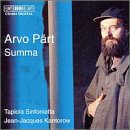| All Artists: Arvo Part, Jean-Jacques Kantorow, Jouko Laivuori, Tapiola Sinfonietta Title: Pärt: Summa Members Wishing: 1 Total Copies: 0 Label: © 1998 Musical Heritage Society, Inc. Release Date: 2/18/1997 Album Type: Import Genre: Classical Styles: Chamber Music, Forms & Genres, Concertos, Sonatas, Instruments, Reeds & Winds Number of Discs: 1 SwapaCD Credits: 1 UPC: 789368504725 |
Search - Arvo Part, Jean-Jacques Kantorow, Jouko Laivuori :: Pärt: Summa
 | Arvo Part, Jean-Jacques Kantorow, Jouko Laivuori Pärt: Summa Genre: Classical
|
Larger Image |
CD Details |
CD ReviewsGreat Introduction to Pärt's music... ewomack | MN USA | 12/20/2004 (5 out of 5 stars) "Arvo Pärt has slowly emerged over the last two decades from relative obscurity into one of today's preeminent composers. His upbringing under Soviet Russia explains some of his early obscurity. But his compositional career has spanned many styles, some of which Pärt abandoned or refashioned into his own personal voice. It wasn't until the late 1970s (around 1976-1977) that Pärt discovered this voice he calls "tintinnabulation" (for the resonance of bells that the triadal tonality of his compositions are meant to evoke). From that point on his compositions have inexorably followed this form. Where his early works experimented in musical collages and sometimes harsh dissonance, his later works exude a calm contemplation, particularly a contemplation of suffering or longing. The tension in these works originates from his compositional technique, where triads simulate harmonics and overtones, evoking a non-resolution that always seems balanced on the brink of total resolution on an almost note-for-note level. This CD includes some of Pärt's best known work, and also gives a sampling of his earlier compositional styles. Those familiar only with Pärt's later work may recoil at the harshness and periodic atonality of "Collage sur Bach" from 1964. This work is what it says it is: bits of Bach pieced together for effect in a musical analogy of a photographic collage. Here the piece stands out like solar prominence juxtaposed with Pärt's later work, which makes up the rest of the disc. A good representative sample of the later Pärt fills out the disc. Some of his most famous pieces are here: "Fratres", "Cantus in memoriam Benjamin Britten", and "Tabula rasa". These three pieces were composed in the inital catharsis of Pärt's discovery of his personal style around 1977. All of them are intense, forlorn, moving, and awe-inspiring. Hearing them together on one disc gives good justification for Pärt's ever growing reputation as an important contemporary composer. The two remaining pieces on the disc, "Summa" and "Festina lente" date from around the early 1990's. They also provide good samples of Pärt's style and the directions he's taken it following his discovery. All together this disc serves as a great introduction to Pärt's music. It also serves as a testament that beautiful music can arise from formalism and minimalism (Pärt can arguably be categorized as both, but only arguably). It also provides evidence that contemporary music is not only made up of pounding tone clusters (though "Collage sur Bach" contains many) or spine-bending atonality (not that there's anything wrong with atonality, it's just not for everyone). In Pärt we see a rebirth of an almost medieval appreciation of form, beauty, and suffering. And the twentieth century has contained its fair share of suffering to muse upon." Part and parcel danshur | chicago | 12/10/2000 (5 out of 5 stars) "This disc has so much to say about "classical" music it is difficult to make any hard and fast comments about it. The Collage sur Bach, will surely send any student of Bach's music back to the drawing room. It's as if Jimi Hendricks picked up the baton, fenced with the master, and settled down to reinvent the sound of his own music. Summa, like all of the rest of Part's music, is about the soul, but not only the soul, its about the heart of soul. Not only about the spirit, but also about the feelings of the spirit. Those dissonant places; where we feel doubt, where we fear our convictions, where we feel alone in our faith, are not ignored, but revered and expressed by this composer in his music. Not glorified, deified, but respected and spoken. Our humanity confirmed, Part brings us closer to experiencing that higher spiritual plane, without cringing in our humanness. I love this disc, and highly recommend it to anyone who believes that music can bind the heart, and soul, and mind."
|

 Track Listings (9) - Disc #1
Track Listings (9) - Disc #1